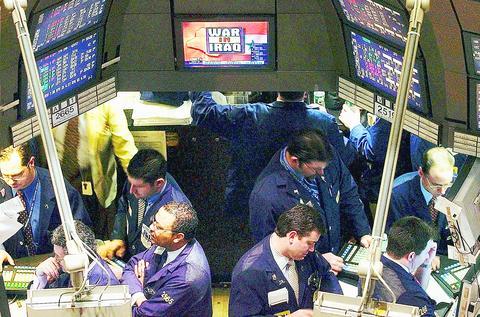Is the bell tolling for the New York Stock Exchange's daily market-opening ritual? On three mornings this week, the exchange refrained from its daily ceremony in which invited guests, who have included Arnold Schwarzenegger and Nelson Mandela, ring the opening bell for television viewers around the world.
The longest bear market since the Great Depression, and the Iraq war may have dampened enthusiasm for the eight-year-old practice.

PHOTO: AP
"People are not in a celebratory mood," said Clive Chajet, chairman of Chajet Consultancy, who recently rang the opening bell at the neighboring American Stock Exchange after advising that exchange on marketing.
Ringing the opening bell Monday: Susan Byrne, chief executive of Westwood Holdings Group Inc, a Dallas-based institutional money manager celebrating its 20th anniversary. NYSE clerk Martin Torelli rang the bell today. His brother, Lieutenant Colonel Christopher Torelli, is with a US Army counter-terrorism unit overseas.
Robert Zito, the exchange's executive vice president for communications, didn't immediately return calls for comment.
When the exchange skips the opening bell ceremony, a sole floor official pushes a button that clangs a 10-second bell in each of the exchange's five trading rooms. It kicks off US trading in stocks at 9:30am.
Commercializing the opening bell dates to 1995, when exchange Chairman Richard Grasso, elevated to the top job after working his way up the exchange ranks, began promoting the NYSE as a "brand." Zito approached General Electric Co's CNBC financial news network, which was broadcasting from the American Stock Exchange, and suggested the company do live reports from the NYSE floor. The bell ceremony is now broadcast on some two-dozen networks around the world and reaches some 110 million viewers a day.
Exchange staffers cautioned not to read too much into the ringing rout. Chief executives of the exchange's 2,800 listed companies often ask to ring the bell to mark anniversaries or promotions, and the lull may be a fluke of scheduling.
Yet the ringing is also a perk of companies going public, and just three this year debuted on the Big Board: Provident Financial Services, Endurance Specialty Holdings Ltd, and Telkom SA Ltd.
The benchmark Standard & Poor's 500 Index has lost 43 percent from its peak in March 2000.
"The IPO business," said Grasso at a briefing yesterday, "is virtually non-existent."

Nvidia Corp chief executive officer Jensen Huang (黃仁勳) on Monday introduced the company’s latest supercomputer platform, featuring six new chips made by Taiwan Semiconductor Manufacturing Co (TSMC, 台積電), saying that it is now “in full production.” “If Vera Rubin is going to be in time for this year, it must be in production by now, and so, today I can tell you that Vera Rubin is in full production,” Huang said during his keynote speech at CES in Las Vegas. The rollout of six concurrent chips for Vera Rubin — the company’s next-generation artificial intelligence (AI) computing platform — marks a strategic

REVENUE PERFORMANCE: Cloud and network products, and electronic components saw strong increases, while smart consumer electronics and computing products fell Hon Hai Precision Industry Co (鴻海精密) yesterday posted 26.51 percent quarterly growth in revenue for last quarter to NT$2.6 trillion (US$82.44 billion), the strongest on record for the period and above expectations, but the company forecast a slight revenue dip this quarter due to seasonal factors. On an annual basis, revenue last quarter grew 22.07 percent, the company said. Analysts on average estimated about NT$2.4 trillion increase. Hon Hai, which assembles servers for Nvidia Corp and iPhones for Apple Inc, is expanding its capacity in the US, adding artificial intelligence (AI) server production in Wisconsin and Texas, where it operates established campuses. This

Garment maker Makalot Industrial Co (聚陽) yesterday reported lower-than-expected fourth-quarter revenue of NT$7.93 billion (US$251.44 million), down 9.48 percent from NT$8.76 billion a year earlier. On a quarterly basis, revenue fell 10.83 percent from NT$8.89 billion, company data showed. The figure was also lower than market expectations of NT$8.05 billion, according to data compiled by Yuanta Securities Investment and Consulting Co (元大投顧), which had projected NT$8.22 billion. Makalot’s revenue this quarter would likely increase by a mid-teens percentage as the industry is entering its high season, Yuanta said. Overall, Makalot’s revenue last year totaled NT$34.43 billion, down 3.08 percent from its record NT$35.52

SEMICONDUCTORS: The German laser and plasma generator company will expand its local services as its specialized offerings support Taiwan’s semiconductor industries Trumpf SE + Co KG, a global leader in supplying laser technology and plasma generators used in chip production, is expanding its investments in Taiwan in an effort to deeply integrate into the global semiconductor supply chain in the pursuit of growth. The company, headquartered in Ditzingen, Germany, has invested significantly in a newly inaugurated regional technical center for plasma generators in Taoyuan, its latest expansion in Taiwan after being engaged in various industries for more than 25 years. The center, the first of its kind Trumpf built outside Germany, aims to serve customers from Taiwan, Japan, Southeast Asia and South Korea,